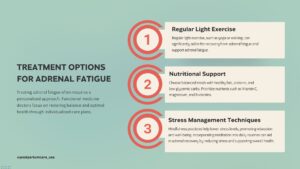Adrenal fatigue is a condition believed to occur when chronic stress overworks the adrenal glands, resulting in symptoms like persistent fatigue and sleep difficulties. Although not recognized officially by many medical professionals, it has gained attention in alternative medicine. This article covers the basics of adrenal fatigue, its symptoms, causes, and treatments.
Key Takeaways
- Adrenal fatigue, linked to chronic stress, lacks widespread acceptance in conventional medicine and is distinct from adrenal insufficiency, which is a recognized medical condition.
- Symptoms of adrenal fatigue include chronic fatigue, sleep disturbances, cognitive issues, emotional instability, and physical symptoms, often overlapping with other health conditions.
- Effective treatment for adrenal fatigue involves personalized approaches, including lifestyle and dietary changes, stress management techniques, and the potential use of adaptogenic herbs.
Understanding Adrenal Fatigue
Adrenal fatigue is a condition characterized by the overworking of the adrenal glands due to chronic stress. The adrenal glands, small organs located atop your kidneys, produce hormones like cortisol that help regulate your metabolism and stress response. When stress levels remain elevated over prolonged periods, these glands may struggle to maintain normal hormone production, potentially leading to what some refer to as adrenal hormones fatigue.
Interestingly, the concept of adrenal fatigue isn’t widely accepted in conventional medicine. Many medical professionals do not recognize it as a true medical condition due to a lack of scientific evidence. The theory linking stress exposure to adrenal fatigue is based on the idea of adrenal exhaustion, a state where the adrenal glands’ ability to produce hormones is compromised due to constant demand.
Despite the controversy, the adrenal fatigue theory was first introduced in 1998 and has since gained a significant following, especially in alternative medicine circles. Nearly 80% of adults in the United States may experience some form of adrenal dysfunction, making this topic highly relevant. While scientific reviews have concluded that there is no direct evidence linking adrenal impairment to fatigue, many individuals report symptoms that align closely with this condition; however, scientific proof exists that challenges the validity of the adrenal fatigue theory.
Difference Between Adrenal Fatigue and Adrenal Insufficiency
Distinguishing between adrenal fatigue and adrenal insufficiency, often known as Addison’s disease, is important:
- Adrenal insufficiency is a recognized medical condition where the adrenal glands produce insufficient hormones, specifically cortisol and aldosterone.
- Diagnosing adrenal insufficiency involves blood tests measuring cortisol and ACTH levels.
- These tests can confirm whether the adrenal glands are underperforming.
One common misconception is that adrenal fatigue is a mild form of adrenal insufficiency. However, they are distinct conditions. While adrenal insufficiency has specific diagnostic criteria and symptoms, adrenal fatigue lacks formal recognition and diagnostic standards. Avoiding confusion between these two conditions is vital for ensuring proper treatment and care.
Symptoms of Adrenal Fatigue
The symptoms of adrenal fatigue can be varied and often overlap with other medical conditions, making it challenging to diagnose. One of the most common symptoms is waking up feeling tired and experiencing chronic fatigue that worsens during stressful periods. Individuals often report low energy levels throughout the day, particularly in the afternoon, making it difficult to stay productive. A common symptom of adrenal fatigue is that many individuals feel tired.
Sleep disruptions are another hallmark of adrenal fatigue. Many people find it hard to fall asleep or maintain adequate sleep in their restful sleep cycle, which only exacerbates their fatigue. Cognitive issues such as brain fog, difficulty concentrating, and forgetfulness are also frequently reported, severely impacting daily life.
Emotional instability, including anxiety and depression, is common among those suffering from adrenal fatigue and hormonal fluctuations. Physical symptoms may include muscle and joint pain, inflammation, and frequent dizziness. Additionally, a weakened immune response, unexplained weight gain, low libido, and low blood pressure are other symptoms, including a symptom of adrenal that individuals may experience, which can lead to an adrenal crisis.
Causes of Adrenal Fatigue
Chronic stress is often cited as the primary cause of adrenal fatigue. Prolonged exposure to stress can overwork the adrenal glands, making it difficult for them to keep up with the body’s hormonal demands. The adrenal glands are crucial for producing stress hormones like cortisol, which help manage the fight-or-flight response. When this response is constantly activated due to long-term stress, the glands may become exhausted.
Emotional stress, such as anxiety or depression, can exacerbate adrenal fatigue. Physical stress, including illness or injury, also plays a significant role. Both types of stress can disrupt the normal function of the adrenal glands, leading to what some describe as adrenal dysfunction.
Diagnosing Adrenal Fatigue
Diagnose adrenal fatigue is challenging due to the lack of formal diagnostic criteria and the fact that many medical conditions can cause similar symptoms. Standard blood tests often show normal hormone levels, making it difficult to confirm adrenal fatigue through conventional methods. It is essential to detect adrenal fatigue accurately for effective treatment.
Instead, diagnosing this condition often involves a combination of hormone level assessments and a thorough evaluation of detailed patient interviews to rule out other health issues, including potential hormonal changes and hormonal imbalances.
Blood Tests
Blood tests play a critical role in assessing adrenal health. These tests typically evaluate cortisol and ACTH levels, which are essential for understanding adrenal function. Cortisol helps regulate metabolism and the body’s stress response, while ACTH stimulates cortisol production.
Although these tests are significant for diagnosing conditions like adrenal insufficiency, they may not confirm adrenal fatigue.
Saliva Tests
Saliva tests are another method used to measure cortisol levels at various times of the day, offering valuable insights into the body’s ability to regulate adrenal function. This process typically involves collecting saliva samples at specific intervals to assess hormone levels.
Tracking daily cortisol levels can help determine if they are within normal ranges and contribute to diagnosing adrenal fatigue, as the body can produce cortisol in varying amounts throughout the day.
Treatment Options for Adrenal Fatigue
Treating adrenal fatigue often requires a personalized approach. Functional medicine doctors focus on restoring balance and optimal health through individualized care plans. These plans may include nutrition, lifestyle modifications, and natural supplements.
Holistic approaches like using adaptogenic herbs, omega-3 fatty acids, and practices like meditation and mindfulness are also commonly recommended.
Lifestyle Changes
Regular light exercise, such as yoga or walking, can significantly aid in the recovery from adrenal fatigue and support adrenal fatigue. These activities help reduce stress levels and promote overall well-being, making them crucial components of any treatment plan.
Nutritional Support
A balanced diet rich in essential nutrients is vital for supporting adrenal recovery. Balanced meals with:
- Healthy fats
- Proteins
- Low-glycemic carbs help maintain adrenal gland function
Essential nutrients often recommended for supporting adrenal health include:
- Vitamin C
- Magnesium
- B vitamins
Adaptogenic herbs such as ashwagandha and rhodiola are also beneficial for those experiencing adrenal fatigue. However, it’s crucial to consult a doctor before starting any new supplements to ensure they are safe and suitable for your specific condition.

Stress Management Techniques
Effective stress management is essential for recovering from adrenal fatigue. Mindfulness practices help lower stress levels, promoting relaxation and well-being. Incorporating meditation into daily routines can aid in adrenal recovery by reducing stress and supporting overall health.
Stress management techniques such as mindfulness and meditation are not just about relaxation; they actively contribute to lowering stress hormones and improving adrenal health. These practices enhance overall well-being and should be a part of any comprehensive treatment plan for adrenal fatigue.
When to See a Doctor
If you experience persistent fatigue or exhaustion that doesn’t improve with rest, it’s essential to consult a doctor. Other medical conditions that can cause symptoms similar to adrenal fatigue include:
- Anemia
- Sleep apnea
- Autoimmune conditions
- Infections
- Hormonal impairments
A doctor can conduct tests to rule out these conditions and provide appropriate treatment.
The doctor will likely ask about your symptoms and medical history during your visit. Blood tests and other diagnostic procedures may be performed to identify any underlying health problems. Seeking medical advice is crucial for ensuring that your fatigue is not due to a more serious medical condition.
Misconceptions About Adrenal Fatigue

Adrenal fatigue is often misunderstood and surrounded by misconceptions. One common myth is that it results from overworked adrenal glands, a widespread medical belief that lacks scientific proof. Despite numerous peer-reviewed studies refuting its validity, many alternative medicine circles continue to promote adrenal fatigue.
Homeopathic practitioners frequently misdiagnose patients with adrenal fatigue based on unreliable tests and may sell ineffective adrenal supplements. Approaching this condition with a critical mind and consulting healthcare professionals ensures accurate diagnoses and effective treatments.
Summary
Adrenal fatigue is a controversial and often misunderstood condition characterized by chronic stress and the overworking of the adrenal glands. While it lacks formal recognition in the medical community, many individuals report symptoms that align closely with this condition. Understanding the differences between adrenal fatigue and adrenal insufficiency, recognizing the symptoms, and knowing the potential causes are crucial steps in addressing this issue.
Effective treatment options include lifestyle changes, nutritional support, and stress management techniques. Consulting a doctor is essential for ruling out other medical conditions and ensuring proper treatment. By taking a holistic and informed approach, individuals can manage their symptoms and improve their overall well-being.
Frequently Asked Questions
What is adrenal fatigue?
Adrenal fatigue is a condition resulting from chronic stress, causing the adrenal glands to become overworked and leading to symptoms like fatigue, cognitive difficulties, and emotional instability. It is crucial to recognize these signs and address the underlying stressors for recovery.
How is adrenal fatigue different from adrenal insufficiency?
Adrenal insufficiency is a medically recognized condition with specific diagnostic criteria, whereas adrenal fatigue is not formally recognized and lacks standardized diagnostic measures. Therefore, understanding this distinction is crucial for accurate diagnosis and treatment.
What are the common symptoms of adrenal fatigue?
Common symptoms of adrenal fatigue include persistent fatigue, sleep disturbances, cognitive difficulties, emotional instability, muscle and joint pain, and a reduced immune response. Addressing these symptoms is crucial for overall health.
How is adrenal fatigue diagnosed?
Adrenal fatigue is diagnosed through hormone level assessments and comprehensive patient interviews to exclude other health conditions, given the absence of specific approved tests for this condition.
What are the treatment options for adrenal fatigue?
Effective treatment options for adrenal fatigue involve lifestyle modifications, nutritional support, stress management techniques, and collaboration with a functional medicine doctor for a tailored care plan.
Pin This for Later:



Postnatal Depletion
Meet the Team
Our Services
Supplements
A virtual healthcare clinic that helps postpartum mamas recover from postnatal depletion syndrome with a holistic approach.

Get in touch